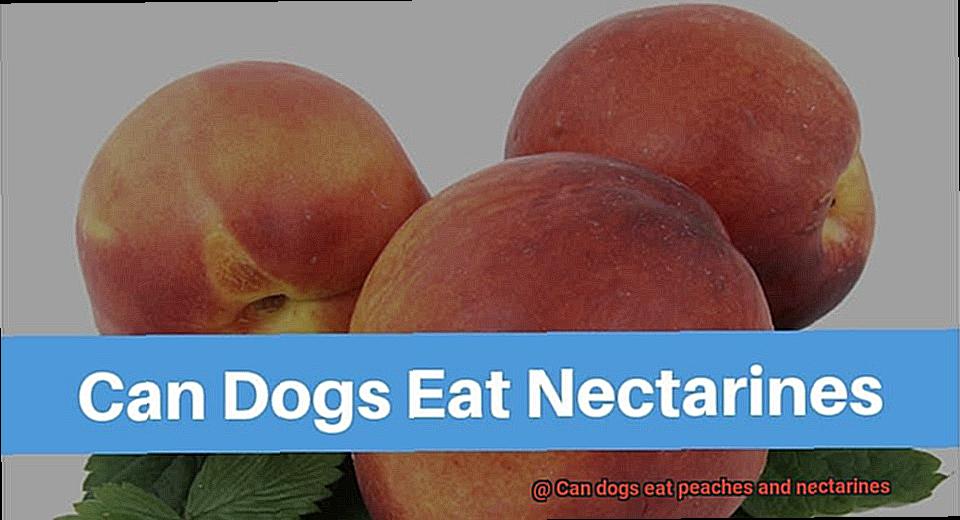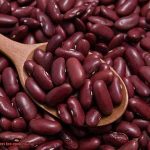Can dogs eat peaches and nectarines?
Today, we’re diving into the juicy and mouthwatering world of peaches and nectarines to answer that burning question: can our furry pals indulge in these fruity delights? As responsible pet parents, we always want to make sure our four-legged friends are getting the best nutrition while satisfying their taste buds. But when it comes to these tempting stone fruits, we need to peel back the layers of knowledge to ensure we’re making the right choices.
Sure, dogs have a unique digestive system that’s different from ours. But let’s face it – they’re always curious about what we’re munching on, especially when it’s those luscious peaches or nectarines. The aroma alone can drive them wild. Yet, before you start tossing these treats into their bowls, let’s explore this topic further to keep our furry companions safe and sound.
So grab yourself a peachy beverage (or not) and join us as we uncover the secrets behind peaches and nectarines. We’ll uncover the potential benefits, risks, and reveal the safest way to introduce these versatile fruits into your pooch’s diet. Get ready for a fruity adventure you won’t want to miss.
Nutritional Benefits of Peaches and Nectarines for Dogs
Contents
- 1 Nutritional Benefits of Peaches and Nectarines for Dogs
- 2 Potential Hazards of Feeding Peaches and Nectarines to Dogs
- 3 How to Prepare Peaches and Nectarines for Dogs
- 4 Moderation is Key When Feeding Fruits to Dogs
- 5 Considerations for French Bulldogs When Eating Peaches and Nectarines
- 6 Symptoms of an Allergic Reaction in Dogs After Eating Peaches or Nectarines
- 7 Canned and Preserved Fruits: Should You Feed Them to Your Dog?
- 8 What If My Dog Eats a Peach or Nectarine Pit?
- 9 Conclusion
While it’s important to feed them a balanced diet, you may wonder if you can share some of your favorite fruits, like peaches and nectarines, with them. In this article, we’ll explore the nutritional benefits of peaches and nectarines for dogs, specifically French Bulldogs.
Can Dogs Eat Peaches and Nectarines?
The answer is yes. Peaches and nectarines are safe for dogs to eat in moderation. These fruits contain essential vitamins and minerals that can contribute to your French Bulldog’s overall health. Let’s dive into the nutritional benefits:
Vitamins A and C:
Peaches and nectarines are rich in vitamins A and C. Vitamin A supports healthy skin, coat, and eyesight, while vitamin C acts as an antioxidant and boosts the immune system. These vitamins are crucial for maintaining your French Bulldog’s well-being.
Fiber:
Both peaches and nectarines are excellent sources of dietary fiber. Fiber promotes healthy digestion in dogs, preventing constipation and regulating bowel movements. It can also aid in weight management, which is important for French Bulldogs prone to obesity.
Potassium:
These fruits provide potassium, which is essential for proper muscle function and maintaining normal blood pressure. Keeping your French Bulldog’s muscles strong and their blood pressure in check contributes to their overall vitality.
Other Beneficial Nutrients:
Peaches and nectarines also contain smaller amounts of other beneficial nutrients such as vitamin E, vitamin K, and niacin. These nutrients play various roles in supporting your French Bulldog’s overall health.
Feeding Guidelines:
Remember to remove the pit and peel before offering peaches or nectarines to your French Bulldog. These parts can be choking hazards or cause digestive issues. Additionally, introduce these fruits gradually to monitor for any adverse reactions or allergies. Offer fresh and ripe fruit as an occasional treat, rather than a regular part of their diet.
Potential Hazards of Feeding Peaches and Nectarines to Dogs
Summer – the season of sunshine, beach trips, and ripe, juicy peaches and nectarines. As a French Bulldog owner, you want to share all the joys of the season with your furry companion.

But before you do, it’s important to be aware of the potential hazards that these fruits can pose to your pup. In this article, we’ll delve into the dangers lurking in those delectable peaches and nectarines and provide you with expert advice on how to keep your French Bulldog safe and healthy.
The Perilous Pit:
The pit or stone found in peaches and nectarines may seem harmless, but it harbors a dangerous secret – amygdalin. This sneaky substance can convert into cyanide when ingested by your four-legged friend.
Cyanide can wreak havoc on a dog’s system, causing symptoms like vomiting, diarrhea, and difficulty breathing. So, always remember to remove those pits before sharing a fruity treat with your Frenchie.
Skin Deep Trouble:
The skin of peaches and nectarines may be tough for our canine companions to digest effectively. This can lead to tummy troubles like upset stomachs, bloating, and diarrhea. And let’s not forget that fuzzy peach skin.
While it may be irresistibly soft to touch, it can cause irritation in your dog’s mouth or throat if consumed in large quantities. To avoid any discomfort for your Frenchie, it’s best to peel those fruits before serving.
Allergies Afoot:

Just like humans, dogs can have allergies too. Some dogs may develop an allergic reaction to peaches and nectarines. Keep an eye out for common allergy symptoms such as itchiness, redness or swelling of the skin, hives, sneezing, coughing, or difficulty breathing. If you suspect your French Bulldog is having an adverse reaction, consult with your veterinarian for proper guidance.
Sugar Shock:
We all know that sweet treats can be tempting, but too much sugar can lead to weight gain and health issues for our furry friends. Peaches and nectarines are naturally high in sugar, so it’s essential to offer them as an occasional treat and in moderation. Your Frenchie will thank you for keeping their waistline in check.
How to Prepare Peaches and Nectarines for Dogs
Your furry friend can enjoy them too. But before you go ahead and share these delicious fruits with your dog, it’s important to know how to prepare them safely. In this guide, we’ll show you the steps to make sure your pup can enjoy peaches and nectarines without any worries.
Step 1: Selecting the Perfect Fruit
To start, pick ripe and fresh peaches or nectarines for your dog. Look for fruits that are firm yet slightly soft when gently pressed. Avoid using overripe or spoiled fruits, as they may cause tummy troubles for your pet.
Step 2: Wash Away the Dirt
Just like we wash our fruits before eating them, it’s essential to give peaches and nectarines a good rinse. This helps remove any dirt, pesticides, or other contaminants that could be harmful to your furry friend.
Step 3: Pit Removal
The pit of a peach or nectarine can be dangerous for dogs. It can cause choking or even block their intestines if swallowed. To remove the pit, cut the fruit in half along the natural crease and twist gently to separate the halves. Then, use a spoon or knife to scoop out the pit from each half.
Step 4: Bite-Sized Pieces
Now that the pits are gone, it’s time to cut the fruit into small, bite-sized pieces. This makes it easier for your dog to chew and swallow without any trouble. Remember, dogs have smaller mouths than humans, so adjust the size accordingly.
Step 5: Moderation is Key
While peaches and nectarines are healthy treats for dogs, they should be given in moderation. These fruits contain natural sugars that can lead to weight gain or upset stomachs if consumed excessively. Treat them as occasional snacks rather than a regular part of your dog’s daily meals.
Step 6: Observe for Any Reactions
Every dog is unique, and some may have sensitivities or allergies to certain fruits, including peaches and nectarines. When introducing these fruits to your dog’s diet, observe them closely for any adverse reactions. If you notice vomiting, diarrhea, or any other unusual symptoms, discontinue feeding them these fruits and consult your veterinarian.
Moderation is Key When Feeding Fruits to Dogs
Today, we’re going to talk about a topic that’s as sweet as a freshly picked peach – feeding fruits to our adorable Frenchies. While it’s tempting to indulge them in all the fruity goodness, we must remember that moderation is key when it comes to offering these tasty treats.
Why Moderation Matters
Now, you might be wondering why moderation is so important when feeding fruits to our furry friends. Well, let me break it down for you:
- Sugar Rush: Fruits like peaches and nectarines are naturally sweet, but they also contain a significant amount of sugar. Feeding too many of these fruits to your French Bulldog can lead to stomach upset, diarrhea, or even pancreatitis. So, it’s crucial to keep their sugar intake in check.
- Choking Hazard: Ah, those pesky pits and seeds. They may seem harmless, but they can actually be toxic and pose a choking hazard to our beloved Frenchies. Always remove these parts before offering them any fruit.
- Digestive Issues: The skin of peaches and nectarines can sometimes cause digestive issues for dogs, including our lovable French Bulldogs. To avoid any tummy troubles, it’s best to peel the fruit before sharing it with them.

How to Practice Moderation
Now that we understand why moderation is important let’s discuss how we can incorporate peaches and nectarines into our Frenchies’ diet without going overboard. Here are some tips:
- Start Slowly: Introduce these fruits gradually into your Frenchie’s diet. Begin with small pieces and observe their reaction. If they enjoy it and have no adverse effects, you can increase the portion size over time.
- Listen to Their Tummy: Pay attention to any signs of discomfort or digestive issues after feeding peaches or nectarines to your French Bulldog. If you notice anything concerning, consult your veterinarian for further guidance.
- Variety is the Spice of Life: Remember, fruits should only make up a small part of your Frenchie’s overall diet. They still need a balanced meal with other essential nutrients. So, mix it up and provide them with a diverse range of foods to keep them healthy and happy.
Considerations for French Bulldogs When Eating Peaches and Nectarines
Before you share these delectable treats with your French Bulldog, there are a few considerations to keep in mind. In this comprehensive guide, we’ll explore the dos and don’ts of feeding peaches and nectarines to your beloved pet. So let’s dive in and give your furry companion a taste of summer.
The Pit Stop:
When it comes to stone fruits like peaches and nectarines, remember that the pits are a definite no-go zone for your French Bulldog. Those little pits may seem harmless, but they can pose a choking hazard or even cause intestinal blockage. So do your furry friend a favor and remove the pits before serving these fruits.
Sweet Tooth Watch:
We all know how irresistible the sweetness of peaches and nectarines can be, but too much sugar can lead to weight gain and health issues like diabetes. Just like we need to watch our own sweet tooth, it’s important to offer these fruits in moderation as part of a balanced diet for your French Bulldog.
Allergic Alert:
While most French Bulldogs can enjoy peaches and nectarines without any problems, some may have sensitivities or allergies to certain fruits. Keep an eye out for any signs of digestive upset or allergic reactions such as itching, vomiting, or diarrhea after your dog consumes these fruits. If you suspect an issue, consult with your veterinarian for guidance.
Prepping for Paw-fection:
Before serving peaches or nectarines to your French Bulldog, make sure to give them a good wash to remove any dirt or pesticide residues. Remember to remove the pits, stems, and leaves, and cut the fruit into small, bite-sized pieces to make it easier for your furry friend to chew and digest.
Treat, Not Meal Replacement:
While peaches and nectarines can provide some nutritional benefits for dogs, they should not replace a balanced dog food diet. Consider these fruits as occasional treats or use them as toppings or ingredients in homemade dog treats. Variety is the spice of life for your French Bulldog’s diet.
Symptoms of an Allergic Reaction in Dogs After Eating Peaches or Nectarines
French Bulldogs are adorable and lovable companions, but just like humans, they can have food allergies. One common allergen for dogs is peaches and nectarines. If your French Bulldog has consumed these fruits and exhibits any of the following symptoms, it may indicate an allergic reaction:
- Itching: If you notice your French Bulldog scratching excessively or rubbing their face or body against furniture or the floor, it could be a sign of an allergic reaction. The skin may become red, inflamed, or develop rashes.
- Gastrointestinal distress: Dogs can experience digestive issues after eating peaches or nectarines. This includes vomiting, diarrhea, bloating, or excessive gas.
- Swelling: Allergic reactions can cause swelling, particularly around the face, muzzle, eyes, or ears. This swelling may be accompanied by discomfort or pain.
- Difficulty breathing: In severe cases, French Bulldogs may have difficulty breathing due to throat swelling or constriction. This is a medical emergency and requires immediate veterinary attention.
- Anaphylaxis: Although rare, anaphylaxis is a severe and life-threatening allergic reaction. It can manifest as a sudden drop in blood pressure, collapse, pale gums, or even loss of consciousness. If you suspect your French Bulldog is experiencing anaphylaxis, seek emergency veterinary care immediately.
It’s important to remember that not all dogs will have the same reaction to peaches and nectarines. Some French Bulldogs may be more sensitive to certain proteins or compounds found in these fruits. If you suspect that your French Bulldog is having an allergic reaction after consuming peaches or nectarines, it’s crucial to consult with your veterinarian for an accurate diagnosis and appropriate treatment.
Prevention is key when it comes to avoiding allergic reactions in French Bulldogs. If your furry friend has a known allergy to peaches or nectarines, it’s essential to keep these fruits out of their reach and ensure they are not included in their diet. Always consult with your veterinarian before introducing any new foods into your French Bulldog’s diet to prevent potential allergic reactions.
Canned and Preserved Fruits: Should You Feed Them to Your Dog?
French Bulldogs are beloved pets known for their friendly nature and unique appearance. As responsible pet owners, it’s important to consider the foods we feed our furry friends, including fruits. While canned and preserved fruits may seem like a convenient option, there are several factors to be aware of before including them in your French Bulldog’s diet.
Added sugars and syrups:
Canned and preserved fruits often contain sweeteners that can be harmful to dogs. These additives can lead to weight gain, dental issues, and even diabetes if consumed in large quantities. It’s crucial to read the ingredient label carefully and avoid products with added sugars or syrups.
Preservatives:
Some canned fruits are preserved using additives such as sodium benzoate or sulfites. These substances can be toxic to dogs and may cause adverse reactions like vomiting, diarrhea, or allergic responses. Opting for products without preservatives is essential to ensure your French Bulldog’s safety.
Nutritional concerns:
During the processing and canning process, some of the nutrients in fruits may be lost. Fresh, raw fruits generally contain higher levels of vitamins, minerals, and antioxidants compared to processed options. Feeding your French Bulldog canned fruits may not provide the same nutritional benefits as fresh fruits.
Caloric content:
Canned fruits preserved in heavy syrup can have a high calorie content. Dogs have different caloric needs compared to humans, and excessive consumption of high-calorie fruits can lead to weight gain and other health issues. Moderation is key when offering canned or preserved fruits as occasional treats.
Ingredient selection:
When choosing canned or preserved fruits for your French Bulldog, look for products that do not contain added sugars or preservatives. Opt for 100% fruit in water or juice instead of those preserved in syrup. Remember to remove any pits or seeds that can pose choking hazards or contain toxins.
What If My Dog Eats a Peach or Nectarine Pit?
French Bulldogs are known for their playful antics and insatiable appetites. But what happens when their curiosity gets the best of them and they accidentally gobble up a peach or nectarine pit? As an expert on this topic, I’m here to shed light on the potential dangers and provide valuable insights to keep your furry friend safe.
Size Matters: The Perilous Pit
Peach and nectarine pits may seem harmless, but their size can spell trouble for your dog. These pits are larger compared to other fruit seeds, making them more likely to become lodged in your dog’s esophagus or intestines. This can lead to discomfort, pain, and even necessitate surgical intervention. It’s like trying to fit a square peg in a round hole – it just doesn’t work.
Cyanide Catastrophe: A Toxic Compound
Beyond their size, peach and nectarine pits harbor a sinister secret – amygdalin. This compound breaks down into cyanide when metabolized by the body. Yes, you heard that right – cyanide. While the amount of cyanide in a single pit may not be lethal, it’s still not something you want your furry friend ingesting.
Watch Out for Warning Signs
If you suspect your dog has swallowed a peach or nectarine pit, it’s crucial to keep a close eye on them. Look out for symptoms such as vomiting, diarrhea, abdominal pain, or changes in behavior. These could be signs of an obstruction or toxicity. When in doubt, don’t hesitate to reach out to your veterinarian for guidance – they’re the experts after all.
Prevention is Key
The best way to protect your pooch is prevention. Store peaches and nectarines in a secure location where your dog can’t get their paws on them. And when you’re enjoying these delicious fruits outdoors, be extra cautious. Dogs are notorious scavengers and may snatch up discarded pits left behind by careless picnickers.
So, the next time you’re tempted to share your juicy peach or nectarine with your French Bulldog, think twice. Remember the potential dangers that lie within those seemingly innocent pits. Opt for fresh fruits instead, and keep your furry friend safe and healthy. After all, a healthy dog is a happy dog.
S1xnWxBQ4PM” >
Conclusion
In conclusion, it is important to remember that dogs can indeed enjoy the sweet and juicy goodness of peaches and nectarines.
Additionally, moderation is key when it comes to feeding fruits to dogs, as too much can lead to an upset stomach or diarrhea.




